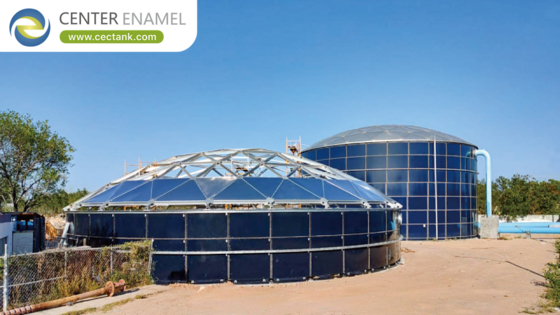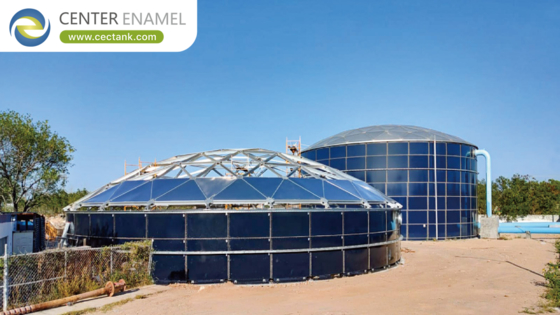-
Glass Fused To Steel Tanks (419)
-
Stainless Steel Tanks (421)
-
Fusion Bonded Epoxy Tanks (424)
-
Galvanized Steel Tanks (321)
-
Aluminum Dome Roofs (947)
-
Wastewater Storage Tanks (226)
-
Welded Steel Tanks (297)
-
Pressure Vessels (295)
-
Anaerobic Digester (201)
-
Industrial Water Tanks (349)
-
Glass Lined Steel Tanks (180)
-
Bolted Steel Tanks (181)
-
Sludge Storage Tank (115)
-
Biogas Storage Tank (173)
-
Leachate Storage Tanks (133)
-
Agricultural Water Storage Tanks (179)
-
Fire Water Tank (166)
-
Grain Storage Silos (130)
-
Biogas Projects (349)
-
Wastewater Treatment Projects (270)
-
Double Membrane Roof (223)
Floating Roof for Emergency Fuel Oil Storage Tanks: Secures fuel integrity for critical use
| Place of Origin: | China |
| Brand Name: | Center Enamel |
| Certification: | ISO 9001 |
| Model Number: | Aluminum Dome Roofs |
| Minimum Order Quantity: | 1 |
| Price: | 100-50000 |
| Packaging Details: | 2000 |
| Delivery Time: | 8 weeks |
| Payment Terms: | L/C, T/T |
| Supply Ability: | 6000 |
|
Detail Information |
|||
Product Description
Floating Roof for Emergency Fuel Oil Storage Tanks: Secures fuel integrity for critical use
In a world increasingly reliant on uninterrupted power and essential services, the integrity of emergency fuel supplies is non-negotiable. Critical infrastructure, including hospitals, data centers, and power generation facilities, must have access to a reliable fuel source to ensure continuous operation during blackouts or emergencies. The long-term storage of emergency fuel oil poses a unique challenge: protecting the fuel from degradation, contamination, and evaporation over extended periods. Floating roof tanks have emerged as the premier solution for this vital application. By creating an impenetrable barrier between the fuel and the external environment, these tanks secure fuel integrity, mitigate fire risks, and ensure that the stored fuel is ready for use the moment it is needed. The floating roof tank is a powerful example of how specialized engineering contributes directly to public safety and operational resilience.
Product Features and Advantages
The concept behind a floating roof tank is to eliminate the dangerous vapor space that exists in conventional fixed-roof tanks. A floating roof is a physical structure that rests directly on the surface of the stored liquid. As the liquid level in the tank rises or falls, the roof moves along with it. This design prevents the fuel oil from coming into direct contact with the atmosphere, which is crucial for preventing degradation and mitigating fire risks.
This technology offers several key advantages for emergency fuel oil storage:
Secures Fuel Integrity: By isolating the fuel from the atmosphere, floating roofs prevent oxidation and the absorption of moisture, which are common causes of fuel degradation. This ensures that the emergency fuel remains in pristine condition, even after years of storage.
Prevents Contamination: The floating roof acts as a robust barrier against external contaminants like dust, debris, and rainwater. This is particularly important for emergency fuel, as even small amounts of foreign material can clog filters and damage engines, rendering the fuel unusable in a crisis.
Drastically Reduces Evaporation: By eliminating the vapor space, floating roofs prevent the evaporation of volatile components, which not only reduces product loss but also ensures the fuel's chemical composition and performance are maintained over time.
Enhanced Safety: The absence of a large vapor space means there is no flammable vapor-air mixture to ignite, providing a crucial layer of safety and risk mitigation against fires and explosions, which is paramount for facilities with critical operations.
Product Applications
Floating roof tanks are highly versatile and find a range of applications within the energy and critical infrastructure sectors. They are the preferred choice for storing volatile liquids where minimizing degradation and ensuring purity for long-term reliability are essential. They are widely used for:
Emergency Fuel Oil Storage Tanks: Specifically designed for power plants, hospitals, and large-scale data centers that require an uncompromised backup fuel supply to ensure continuous operation.
Standby Generator Fuel Storage: Essential for government buildings, military bases, and communication centers where fuel for backup generators must be protected from contamination and degradation.
Refined Oil Storage: Used in terminals and distribution centers to protect high-value refined products from atmospheric exposure, preserving their integrity for various applications.
Aviation Fuel Tanks: A critical technology for airports and airbases to ensure jet fuel meets stringent quality standards by preventing contamination and evaporation.
Company Advantages
Center Enamel is a recognized leader in the storage tank industry. Our commitment to quality is underscored by a rigorous manufacturing process that adheres to international standards, including ISO 9001 and EN1090. Our dedicated R&D team continuously innovates to advance the technology, ensuring our tanks remain at the forefront of the industry. We offer a comprehensive "Full Chain Service" that guides every client from initial engineering consultation and bespoke design to efficient on-site installation and global after-sales support. This integrated approach guarantees a seamless project experience and a durable, high-performing end product.
Company Case Studies
The following case studies, based on common industrial applications, demonstrate the effectiveness of floating roof tanks in various critical storage scenarios.
Case 1: Power Plant Emergency Fuel Storage
A large-scale power generation facility needed to upgrade its emergency fuel oil storage to ensure a reliable and consistent supply during unforeseen grid failures. The primary concern was the long-term integrity of the fuel, which had to be protected from degradation and contamination. Floating roof tanks were chosen for their ability to isolate the fuel from the atmosphere, providing a secure, long-term containment solution. This solution enabled the power plant to maintain a high-quality fuel reserve, ensuring operational continuity in any emergency scenario.
Case 2: Data Center Backup Fuel Supply
A major data center required a new storage solution for its backup generators to guarantee uninterrupted service to its clients. The project called for a tank system that could protect diesel fuel from moisture, contaminants, and oxidation over prolonged periods of inactivity. The project team selected floating roof tanks for their ability to maintain fuel integrity. The tanks were successfully installed, ensuring a consistent supply of clean, high-quality diesel for the data center's emergency power systems.
Case 3: Military Base Fuel Depot
A military base needed a new fuel depot to store a substantial quantity of fuel for both routine operations and emergency response. The fuel had to be stored in pristine condition for an indefinite period to ensure readiness. The base chose to install multiple floating roof tanks. The floating roof design was crucial in this application as it eliminated the vapor space, significantly cutting down on fire risk and providing an unparalleled level of protection against contamination, thereby ensuring the readiness and reliability of the fuel supply.
Conclusion
The floating roof tank stands as an indispensable component of modern emergency fuel oil storage. Its ability to secure fuel integrity, prevent contamination, and enhance safety makes it a superior solution for critical applications. By providing a reliable barrier against atmospheric exposure, floating roofs ensure that vital fuel reserves are always in a state of readiness, safeguarding essential services and promoting resilience in the face of unforeseen events. As industries and public services continue to prioritize reliability and safety, the demand for high-performing containment solutions like floating roof tanks will only continue to grow.




